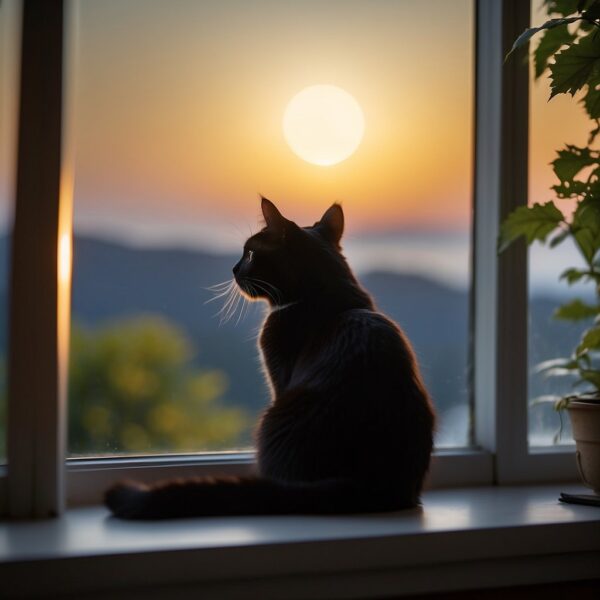
Will a Solar Eclipse Affect My Cat
When a solar eclipse occurs, it is a natural phenomenon that captivates human interest, but the effect on pets, particularly cats, garners curiosity among cat parents. Observations and studies indicate that solar eclipses have little to no direct impact on feline behavior. Cats may notice the change in lighting conditions, but this is about as far as their awareness typically extends. During the event, the more noticeable changes in cats’ behavior may stem from the reactions and activities of their human companions.
While the eclipse itself is silent and short-lived, the environmental changes surrounding an eclipse—such as dimming light and a possible drop in temperature—could potentially cause some confusion among cats. However, compared to other disruptive events like fireworks or thunderstorms, a solar eclipse is less likely to provoke a strong reaction from cats. That said, the ambiance of excitement or nervousness from crowds of people gathering to observe the phenomenon could influence a cat’s behavior due to their sensitivity to human emotions.
Key Takeaways
- Solar eclipses are unlikely to affect cat behavior significantly.
- Cats may experience confusion due to changes in light or their guardians’ reactions.
- Ensuring cats’ comfort can minimize any stress during the eclipse.
Understanding Solar Eclipses
Solar eclipses are intriguing astronomical events with distinct characteristics and occurrences. This section delves into the specifics of what solar eclipses are and the different types that can be observed.
What Is a Solar Eclipse?
A solar eclipse takes place when the Moon moves directly between the Earth and the Sun, casting a shadow on Earth and partially or completely obscuring the Sun’s view for a brief period. This event occurs only during a New Moon when the Sun and Moon are in conjunction as seen from Earth.
Frequency and Types of Eclipses
Solar eclipses happen less frequently in any given location than lunar eclipses. There are four to seven eclipses in a calendar year, but they’re not all solar eclipses, and solar eclipses are not visible worldwide.
Eclipses can be categorized into:
- Total Solar Eclipse: The Moon completely covers the Sun, and it can only be observed from a narrow track on the Earth’s surface.
- Partial Solar Eclipse: Only a part of the Sun is obscured by the Moon.
- Annular Solar Eclipse: The Moon covers the center of the Sun, leaving a ring-like appearance, known as the “Ring of Fire.”
These types recur about every 18 years, a period known as the Saros cycle.
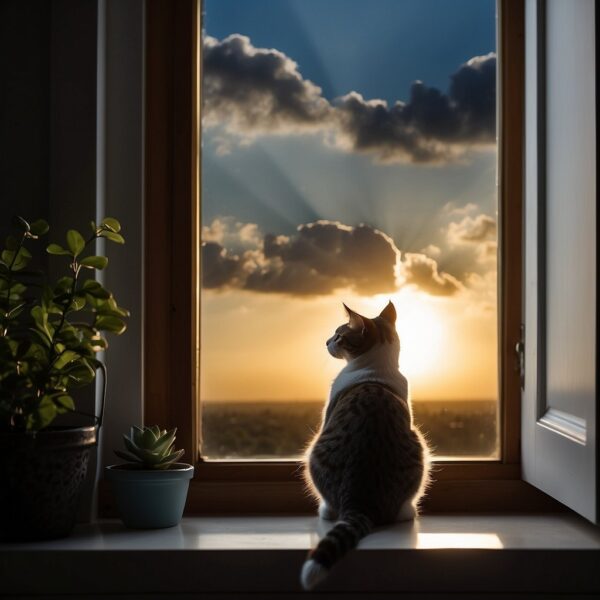
How Cats May Experience a Solar Eclipse
Cats may perceive a solar eclipse differently from humans, primarily due to their distinct vision capabilities and behaviors. Their responses may range from indifference to mild changes in behavior due to the reduced light.
Visual Perception During Eclipses
Cats’ eyes are highly sensitive to light and are adapted to see in low-light conditions. During a solar eclipse, when light levels decrease, cats’ pupils will dilate to allow more light in, ensuring they can still see. However, unlike humans, cats do not have a natural curiosity about celestial events, so they’re unlikely to look directly at an eclipse which reduces the risk of eye damage. Despite this, it’s still important to keep them indoors to prevent them from experiencing discomfort from the aversion to bright light as the sun re-emerges.
Physical Responses in Cats
Cats might display physical responses as a reaction to the changing environment. As light dims, some cats may experience mild anxiety or excitement, similar to their behavior at dusk. You might notice them squinting or seeking shelter due to the changing light levels. It’s key to note that while they can adjust their eye’s aperture to control light input, sudden changes might momentarily disorient them.
Behavioral Changes and Stress Indicators
Behavioral alterations in cats during an eclipse can include seeking comfort or hiding, which could indicate feelings of stress or fear. Observe your cat’s body language—flattened ears, bushy tails, or wide eyes can be telltale signs of distress. Importantly, cats often take cues from their surroundings; thus, a calm environment will help mitigate potential emotional upheaval. Keep them away from loud noises or crowds that may accompany public viewing events, as these can exacerbate stress levels more than the eclipse itself.
Human Influence on Cat Behavior During Eclipses
Cats may respond to the cues given by their parents during a solar eclipse. The behavior of humans can have a significant influence on how their feline companions react to this celestial event.
Cat Parent Behavior and Cat Reactions
Guardians often observe that their pets, including cats, can exhibit unusual behavior during a solar eclipse. Cats, in particular, are very perceptive to their surroundings and can pick up on changes in their guardian’s behavior. If a parent shows excitement or anxiety, a cat may reflect this emotional state. Cats typically look to their guardians for cues on how to respond to new or uncertain situations.
For instance:
- Excited behavior: A guardian preparing to view the eclipse might display signs of excitement, which a cat could interpret as a prompt for playful or curious behavior.
- Anxious behavior: Conversely, if a guardian expresses anxiety—for instance, by pacing or speaking loudly—this could trigger stress or confusion in a cat.
The Role of Human Emotions
Human emotions play a pivotal role in influencing cat behavior during an eclipse. Cats are sensitive to their parent’s emotions and may react accordingly. Emotional cues are as important as physical cues, such as how a parent moves or where they direct their attention. Maintaining a calm and neutral demeanor can help keep a cat at ease.
To break it down:
- Calmness: A parent remaining calm and carrying on with normal routines may signal to their cat that the eclipse is a non-threatening event.
- Stress: On the other hand, visible stress in a parent can lead to similar stress in a cat, leading to behaviors such as hiding or vocalizing.
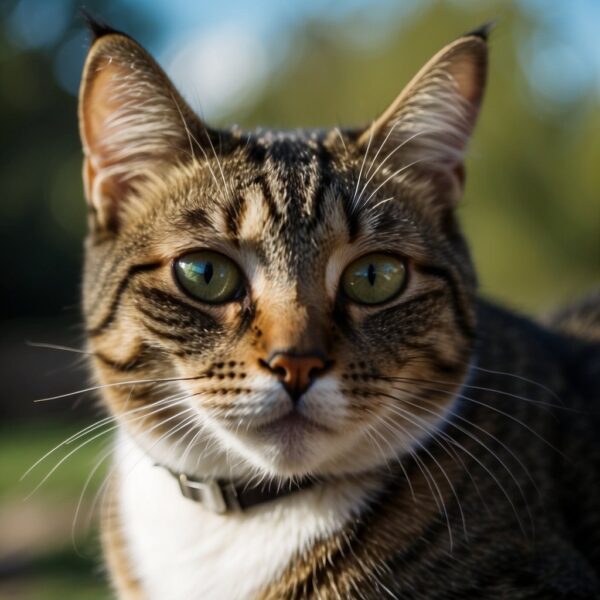
Health and Safety for Cats During Solar Eclipses
During a solar eclipse, it is unlikely that cats will sustain direct eye damage as they innately avoid staring at the bright sun. However, cat parents should be aware of potential anxiety and ensure their pet’s safety.
Protecting Cats’ Eyes
Cats generally do not look directly at the sun, which minimizes the risk of eye damage during an eclipse. Nonetheless, the American Veterinary Medical Association (AVMA) suggests that pets be kept indoors to avoid any chance of eye injury. If watching an eclipse is a shared activity, eclipse glasses are solely for human use, and there is no safe option available for pets.
Mitigating Anxiety and Fear
Cats may experience anxiety or fear due to the sudden change in daylight. To minimize stress, parents should:
- Keep cats in a familiar indoor environment during the eclipse.
- Provide comfort items, such as a favorite toy or blanket.
- Stay calm and reassuring, as pets can pick up on their guardian’s emotions.
Emergency Preparedness for cat parents
Cat parents should prepare for emergencies related to the eclipse by:
- Ensuring their cat has proper identification in case of escape.
- Having a pet emergency kit ready, including water, food, and medications.
- Keeping the contact information for the nearest veterinary clinic readily available.
Practical Tips for Cat parents
Cat parents should focus on ensuring their cats are comfortable and safe during a solar eclipse. While most cats are unlikely to be significantly affected, subtle changes during this natural phenomenon can influence their behavior.
Preparing Your Cat for the Eclipse
Parents should create a comforting environment for their cats, as some may feel uneasy due to the shift in natural lighting. Familiarize the cat with a safe indoor space where sudden darkness won’t be alarming. Providing favorite toys and bedding can enhance their sense of security.
- Environment: Keep indoors with familiar objects
- Comfort: Favorite toys and bedding
Safe Viewing Practices for Parents and cats
While curiosity might lead cat parents to watch the eclipse, it’s crucial that they never allow cats to look directly at the sun. The use of solar eclipse glasses is strictly for humans; pets normally don’t gaze into the sun, so the risk is minimal. Parents should wear their eclipse glasses and refrain from attempting to place them on their pets.
- Parent Precautions: Wear solar eclipse glasses
- Pet Safety: Indoor containment, no eclipse glasses for pets
Post-Eclipse Care and Observation
After the eclipse, cat parents should monitor their cats for any stress-related behaviors such as pacing, panting, or howling. Generally, cats should return to their normal routine shortly after the event. If any unusual behaviors persist, consider contacting a veterinarian.
Environmental and Social Factors
In this section, the specific environmental and social factors that may influence a cat during a solar eclipse are explored. Light and temperature changes, the impact of crowds and traffic, and a comparison to other stressors are the central aspects to consider.
Effects of Light and Temperature Changes
During a solar eclipse, the noticeable decline in light can cause confusion and mild stress in cats. They are sensitive to light changes, which may alter their behavior, leading them to seek shelter or become more vocal. Temperature may drop slightly, but typically not enough to affect cats significantly if they are indoors.
Impact of Crowds and Traffic
Solar eclipses often draw crowds, leading to increased traffic and noise levels. Outdoor cats may find these changes distressing, potentially causing them to hide or avoid usual active areas. Indoor cats may be less affected, though the sounds of crowds and nearby traffic could still lead to some anxiety.
Comparing Eclipse Events to Other Stressors
Compared to other events like storms or fireworks, a solar eclipse is usually less stressful for cats. The lack of loud sounds and sudden light flashes means cats might react to an eclipse more out of curiosity than fear. The associated human activities, such as parties or gatherings to observe the eclipse, might contribute more to a cat’s stress than the eclipse itself.
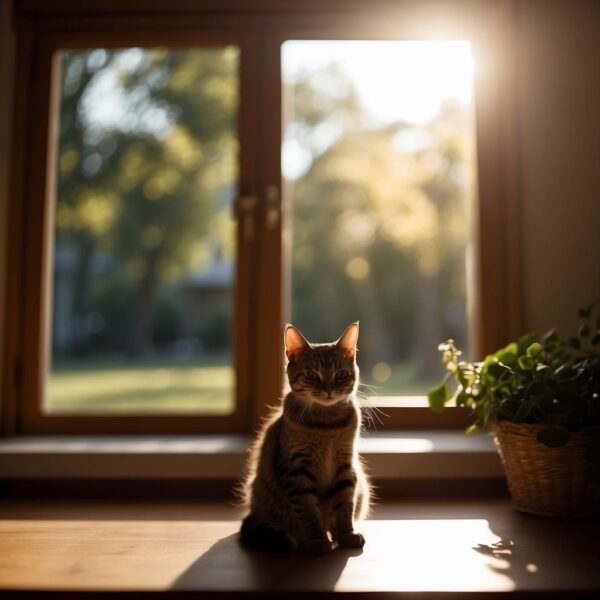
Solar Eclipses and Animal Behavior
Solar eclipses have an observable impact on animal behavior, as different species exhibit various reactions to this celestial event. The following sections break down common animal behaviors during solar eclipses, insights from research on wildlife, and the comparative behaviors between two common household pets: cats and dogs.
Common Reactions in Animals
During a solar eclipse, animals may display reactions that range from subtle to pronounced. For instance:
- Birds may show signs of confusion, often flying back to their nests as they interpret the eclipse as twilight.
- Cats might display mild disinterest or curiosity, but generally, domestic cats are unaffected.
- Dogs can sometimes be more vocal or show signs of anxiety due to the sudden change in their environment.
- Horses have been noted to return to their stables or act as though they are preparing for nightfall.
Research on Wildlife Responses
Scientific studies on wildlife responses to solar eclipses are limited, but they indicate that animal behavior can indeed be affected. Key observations include:
- Zoological parks record a variety of behaviors ranging from apathy in some species to agitation in others.
- A 1560 study reported unusual animal behavior, such as birds falling to the ground during an eclipse, though modern research does not widely support this.
Comparative Behavior: Cats vs. Dogs
The behavior of cats and dogs during a solar eclipse is often governed by their different natures.
- Cats tend to be independent and less reactive to environmental changes, possibly leading to little to no change in behavior during an eclipse.
- Dogs, may exhibit more noticeable changes such as restlessness or seeking comfort from their guardians.
Expert Insights and Recommendations
In considering how a solar eclipse may affect pets, expert opinions and guidelines offer a clear understanding. These insights are vital for pet parents seeking to ensure their cats’ safety and comfort during such astronomical events.
Guidelines from the American Veterinary Medical Association
The American Veterinary Medical Association (AVMA) recommends keeping pets indoors during a solar eclipse to avoid potential anxiety or harm from looking at the sun. They suggest parents observe their pets for signs of distress, which can manifest as atypical behaviors including:
- Increased vocalization
- Pacing or restlessness
- Hiding or seeking solitude
Preventive measures include:
- Providing a quiet, comfortable space inside
- Closing curtains to reduce the visible change in environment
- Staying with pets or providing toys to distract them
Professional Views on Animal Cognition and Behavior
Dr. Erica Cartmill, an expert in anthropology and cognitive science, articulates that while animals have cognitive responses to environmental changes, a solar eclipse is unlikely to cause profound or lasting effects in cats. She notes that:
- Cats may exhibit temporary curiosity or confusion.
- Significant behavioral changes are uncommon.
The professional consensus is that cats, with their adaptable nature, will likely perceive the eclipse as a transient event.
Local Experiences: Case Studies from Indiana and Ohio
Field observations from veterinarians in Indiana and Ohio have documented local pets’ responses to solar eclipses. Notable findings include:
- No reports of eclipse-related injuries or severe anxiety in cats.
- Some cats displayed minor behavioral adjustments, such as seeking out windows or more attention from owners.
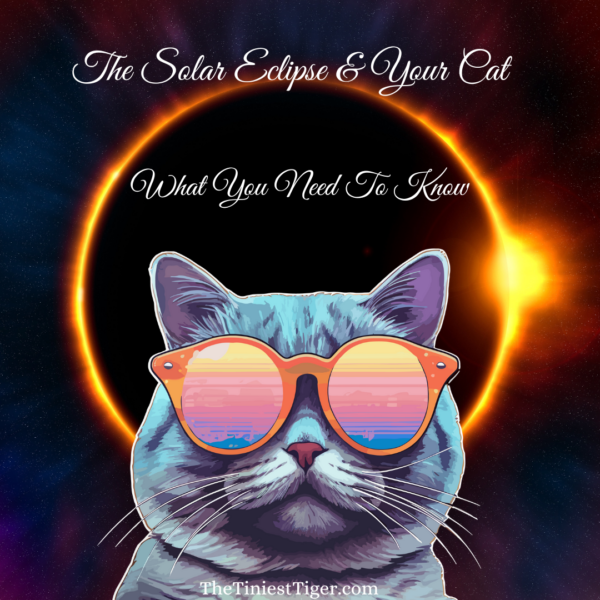
Frequently Asked Questions
This section addresses common queries regarding the impact of a solar eclipse on felines.
How can a solar eclipse potentially impact my cat’s eyesight?
A solar eclipse is not likely to impact a cat’s eyesight directly. Cats typically do not look at the sun, and therefore, the chances of eye damage from an eclipse are minimal.
What changes might occur in my cat’s behavior during a solar eclipse?
During a solar eclipse, some cats may exhibit mild behavior changes such as confusion or agitation due to the changes in natural light. However, significant behavioral changes are uncommon.
Are there any precautions I should take for my cat during a solar eclipse?
While cats are generally not at risk, it is a good idea to keep them indoors as a precaution to prevent any potential distress from the darkening sky or from any surrounding commotion during the event.
Can lunar eclipses also have an effect on my cat or other animals?
Lunar eclipses are less likely to affect cats or other animals because they do not involve a drastic change in environmental light like solar eclipses do.
Is there any scientific evidence that solar eclipses have effects on household pets?
There is limited scientific evidence suggesting that solar eclipses have significant effects on household pets, including cats. Most animals regard it as a peculiar natural phenomenon without substantial impact.
Should I be concerned about the overall wellbeing of my cat during a solar eclipse?
Generally, there is no need to be overly concerned about a cat’s wellbeing during a solar eclipse. Ensuring a safe and calm environment is usually sufficient for their comfort.